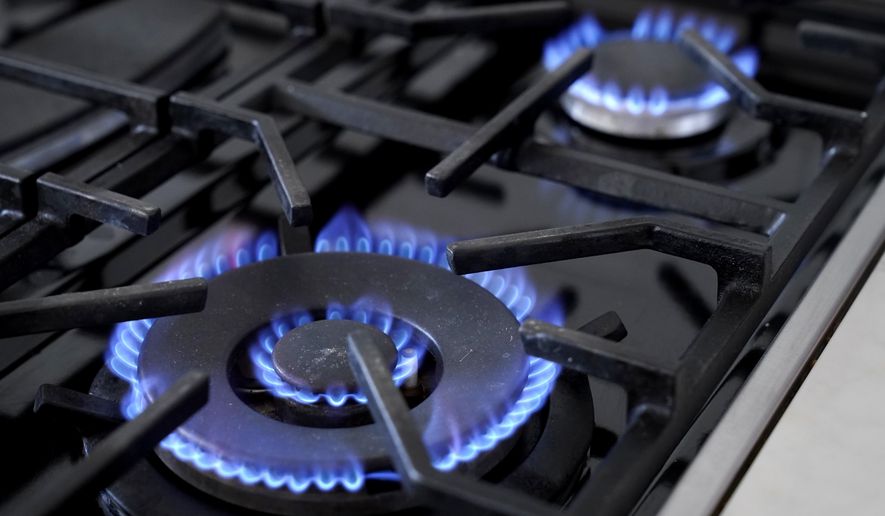A left-leaning environmental group seeking to eliminate fossil fuels wants retail associates at Lowe’s, Home Depot and Best Buy to warn consumers against purchasing gas stoves, citing a study backed by a green-energy group linking the appliances to asthma.
The environmental and public interest group U.S. PIRG Education Fund sent “secret shoppers” to 62 big-box retailers in 11 states to quiz sales associates about gas stoves. They reported that most employees “flatly denied or expressed ignorance” about claims of health risks associated with gas stove cooking and said retailers have failed to equip sales staff with “accurate information” about the dangers of gas stove cooking.
The group is asking retailers to train staff to steer consumers toward electric stoves by promoting their benefits, such as ensuring they have electric induction cooktops on display and advertising rebates and other financial incentives.
“We’re calling on retailers to provide educational materials and train sales staff to answer questions about indoor air pollution and gas stoves, including proper ventilation,” MASSPIRG Education Fund program director Deirdre Cummings said. “It’s an opportunity for big-box chains to be part of the solution rather than part of the problem.”
Ben Lieberman, a senior fellow in environmental policy at the Competitive Enterprise Institute, said gas stoves remain popular with consumers who value their temperature control, heat distribution and lower energy costs than electric stoves.
Employees at the big-box stores probably can’t talk them out of buying one, he said.
“People don’t go to Lowe’s and Home Depot to get an environmental lecture from a 19-year-old,” Mr. Lieberman said.
The U.S. PIRG report was released at the end of February after a consumer backlash led the Biden administration to back down from plans to further regulate gas stoves, which are used in nearly 40% of U.S. kitchens.
In January, the Department of Energy softened plans to increase regulations on gas stoves to reduce emissions. The proposal was widely criticized because it would have eliminated roughly half of all gas stove models and increased cooking times.
The move to regulate gas stoves off the market became a talking point for Republicans and former President Donald Trump, the presumptive Republican presidential nominee.
Rather than move forward with stricter emissions standards for gas stoves, the Energy Department issued more modest rules primarily targeting electric models.
Green-energy groups and several Democratic-run cities and states are eyeing ways to eliminate natural gas and natural gas appliances, including gas stoves, to reach their goals of “net zero” emissions. They often cite indoor air pollution.
Groups seeking to phase out gas stoves point to the widely reported review of study data last year produced partly by the green-energy group Rocky Mountain Institute. It blames gas stoves for nearly 13% of childhood asthma in the U.S.
Other research does not link the stoves to asthma, and some researchers say cooking methods, cooking ingredients and lack of proper ventilation for electric and gas stoves cause most of the indoor air pollution associated with stoves.
A 2013 study of more than a half-million primary and secondary school children from 47 countries found “no evidence of an association” between gas cooking and asthma diagnosis or asthma symptoms.
Officials at U.S. PIRG said the 2013 study is not intended to bolster the safety of gas stoves.
Bert Brunekreef, a professor of environmental epidemiology at the Netherlands’ Utrecht University and co-author of the study, told E&E News last year, “That is not a good use of our study.” The research generally shows that using gas stoves in homes leads to higher levels of nitrogen dioxide, which is associated with respiratory irritation and asthma, he said.
“The overwhelming scientific consensus is that emissions from gas stoves pose health risks,” said Abe Scarr, director of the Illinois PIRG & Illinois PIRG Education Fund and an author of the survey. “This has been documented in dozens of peer-reviewed studies over almost 50 years of research.”
U.S. PIRG is targeting gas stoves beyond claims of health risks. It calls the appliances “the climate enemy you didn’t realize was hiding in your kitchen,” citing estimated annual methane leaks that they said are comparable to the carbon dioxide emissions of a half-million cars.
Using electric stoves and buildings, the organization says, is the only way to stop the oil and gas industry from polluting the planet.
Amy Cooke, visiting fellow on energy and environmental policy at State Policy Network, called the effort to eliminate gas stoves “an example of an out-of-touch, myopic tendency to judge energy resources and appliances solely based on their emissions” that will destabilize the energy grid by forcing consumers to shift to all-electric appliances.
The secret shopper surveys canvassed stores and found that 37% did not feature induction cooking appliances in their showrooms and 69% did not showcase venting hoods next to gas stoves.
Among retail associates secretly surveyed by U.S. PIRG shoppers, 76% said gas stoves “were perfectly safe” or were unaware of “health issues with gas stove emissions.” Just 24% reported what the organization considered accurate information “about the dangers of gas stove emissions.”
Best Buy, Lowe’s and Home Depot did not respond to requests for comments about the U.S. PIRG report.
• Susan Ferrechio can be reached at sferrechio@washingtontimes.com.




Please read our comment policy before commenting.